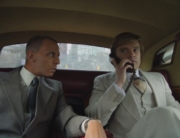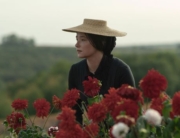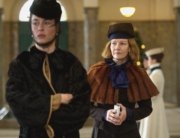The Lady was originally intended to help bring Aung San Suu Kyi, the singular embodiment of Burma’s hopes for democracy, into international movie theaters and out of decades of house arrest. The world waits to see what changes the military will permit her to achieve next, after her recent release and victory in limited parliamentary elections earlier this month. However, this well-meaning biopic will barely satisfy people’s curiosity to know something more about a little-seen woman.
Aung San Suu Kyi is frequently defined here by the (very) good and (very) bad men around her. Opening in Rangoon in 1947, her family is living in a beautiful villa (meticulously reconstructed in Thailand) that will dominate the film, her life, and her international image. Her father Aung San, who helped lead their country to independence from Great Britain, is seen as her first inspiration, teaching her to have pride in Burmese culture through bedtime folk tales. But from that sweet scene, he and his fellow democratic aspirants are brutally assassinated in a bloody takeover. She was only three.
Jumping ahead in time, death also faces her husband, Michael Aris (David Thewlis), in 1998 when he is at work in the Department of Tibetan and Himalayan Studies at Oxford, where his twin brother Anthony (also Thewlis) urges him to tell his wife about his prostate cancer diagnosis. But by then she is kept in isolation in an extremely restrictive Burma, and he hasn’t been able to see her for three years. Then jumping back a decade, she’s played by Michelle Yeoh as a happy wife and mother of two sons in England, busy working on her father’s biography, though not much more is filled in about her childhood in Burma, her education in England, or her work at the United Nations. When she learns about her mother’s illness, she returns to her home country in 1988 to find that her father is still a powerful symbol for democratic hopes.
Nursing her mother, she is repeatedly seen reading Gandhi, which is both an (over) emphasis on her nonviolent principles to achieve political change, and a (bit uneasy) reminder of another, not related, Gandhi (Indira), who inherited the mantle of another famous father. When her family can come to visit, they find the villa filled with political bustle, which gets even busier when the generals announce a referendum. Despite briefly heard accusations that she’s “just a housewife,” she takes up public speaking and exhaustively covers the country to urge votes for her National League for Democracy party. Yeoh, who learned Burmese for these speeches, rises to this expressive transformation. The scenes of her outreach to a colorful array of ethnic groups in the hinterlands are particularly relevant now as the continuing restiveness among them is a major question mark for the country’s future.
As she gains confidence and followers for her party to win the 1990 election, the superstitious martinet generals (with chests full of outsized medals out of the Marx Brothers’ Fredonia) try to figure out how to suppress her, including visiting fortune tellers, because they realize she would be even more of a nuisance as a martyr. So while the skittish, murdering generals nullify her win, party members are put into awful prisons and thrown into horrible dog kennels. She is barricaded behind barbed wire and armed guards.
But her legendary brave challenges to the regime, from facing down soldiers at her front gate to an almost fatal hunger strike that her husband negotiates for her to end, pass like brief interludes in their love story. The regime tries to use her marriage to a foreigner as a propaganda weapon against her bona fides, and her continuing efforts to get into the British embassy to call her family as evidence of her traitorous spying. (The couple coos pet names to each other before phone lines are cut.) Éric Serra’s very Western score loudly swells too sentimentally, emphasizing their relationship.
After years kept apart, Michael desperately takes on a more public role by actively campaigning for international political support, including as the key lobbyist for the Nobel Committee to award her the Peace Prize in 1991. The reenactment of the ceremony is emotional as her sons come forward as her champions, while their mother listens to them on a hidden radio. (Screenwriter Rebecca Frayn interviewed many friends and family members for the personal background.) The couple’s decision for her to stay in Burma during her husband’s final illness, because they know the generals wouldn’t let her return, is played up as a more tragic personal sacrifice than later political events.
Unfortunately, The Lady remains more of a noble symbol. Hopefully, as she leads a closed country to open up, we will eventually get to see her in more complexity.






Leave A Comment